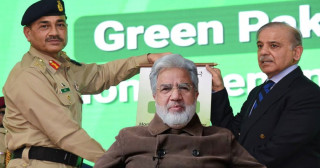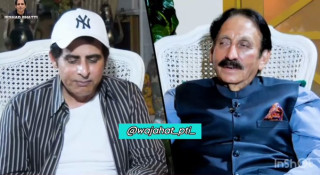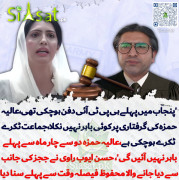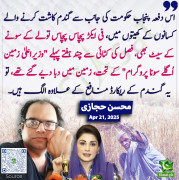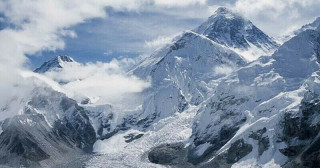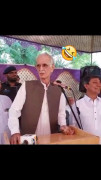
Maoist communist party leader Pushpa Kamal Dahal speaks to the Associated Press during an interview in Kathmandu, Nepal, Wednesday, Nov. 2, 2022. (AP Photo/Niranjan Shrestha)
KATHMANDU, NEPAL - The leader of former communist rebels became Nepal's new prime minister Sunday with the support from his ex-opponent and other smaller political parties.
The announcement was made by the office of President Bidhya Devi Bhandari after the Maoist communist party leader Pushpa Kamal Dahal met her to stake his claim for the prime minister following last month's elections in a major twist in politics in the Himalayan nation.
Dahal has support of more than half the members of the newly elected House of Representatives, the lower house of Parliament.
He is likely to take the oath of office on Monday and prove his majority in the 275-member house later in the week.
Seven parties have pledged their support for Dahal, including his friend-turned-foe Communist Party of Nepal (United Marxist-Leninist), led by Khadga Prasad Oli.
Dahal and Oli had partnered in the last parliamentary election in 2017, but midway through the five-year term they began to squabble on who would continue as the prime minister. It was initially agreed that they would share the term but Oli apparently refused, angering Dahal.
Dahal abandoned the partnership and aligned with Sher Bahadur Deuba and his Nepali Congress party to be part of a new coalition government that was led by Deuba.
After the Nov. 20 elections, Deuba and Dahal fell out after failing to agree on who would become the prime minister.
Dahal, also known as Prachanda, or the "fierce one," led a violent Maoist communist insurgency from 1996 to 2006. More than 17,000 people were killed and the status of many others remains unknown.
The Maoists gave up their armed revolt, joined a U.N.-assisted peace process in 2006 and entered mainstream politics. Dahal's party secured the most parliamentary seats in 2008 and he became prime minister, but quit a year later over differences with the president.
Prior to the elections, Dahal told The Associated Press in an interview that his main goal was to give the country a stable government that would complete the full five-year term.
Nepal has been hampered by political instability, frequent changes in government and squabbles among parties, which has been blamed for delays in writing the constitution and slow economic development.
No government since the abolition of the centuries-old monarchy in 2008 has completed a full term.
https://www.ctvnews.ca/world/leader...-becomes-nepal-s-new-prime-minister-1.6208663
By Al- Jazeera
Ex-Maoist rebel leader Prachanda becomes Nepal PM for third time
Pushpa Kamal Dahal, better known as Prachanda, will head the new government until 2025 as part of a deal reached with another party.

Prachanda gestures as he leaves for the president's office to claim majority for his appointment as the new prime minister, in Bhaktapur on the outskirts of capital Kathmandu [Dipesh Shrestha/AFP]
A former Maoist leader who led a decade-long rebellion against Nepal’s monarchy has been appointed prime minister for a third time, in alliance with the main opposition after last month’s election returned a hung parliament.
Pushpa Kamal Dahal, who still goes by his nom de guerre Prachanda – meaning “terrible” or “fierce” – will head the new government for the first half of the five-year term with the support of the opposition communist Unified Marxist-Leninist (UML) party and other smaller groups, party officials said on Sunday.
“He has been appointed and commands the support of a big majority of parliament,” Tika Dhakal, an aide to President Bidhya Devi Bhandari, told Reuters news agency.
Prachanda is likely to take the oath of office on Monday and prove his majority in the 275-member house later in the week. Seven parties have pledged their support for him.
Prachanda, who replaces Sher Bahadur Deuba of the Nepali Congress party, will step down in 2025, making way for the UML to take over the office, local media reported.
“This is the understanding. Remaining work of distribution of key other posts and ministries is still to be worked out,” Dev Gurung, the general secretary of Prachanda’s Maoist Centre party told Reuters after a meeting of the new coalition.
The new coalition comes to power hours after Prachanda, 68, surprisingly walked out of the ruling alliance led by 76-year-old Deuba.
Deuba, whose Nepali Congress emerged as the single largest party after the November 20 polls, refused to back Prachanda for the prime minister’s job.
Prachanda’s Maoist Centre party won 32 seats in the 275-member House of Representatives. The UML has 78 seats, and the rest, required for the 138-majority, will be controlled by smaller groups.
The Nepali Congress party will be the main opposition controlling 89 seats.
Prachanda hid out for years in the jungle during Nepal’s 1996-2006 civil war that killed nearly 17,000 people and led to the end of the 239-year-old monarchy.
In 2006, the Maoists gave up their armed revolt, joined a United Nations-assisted peace process and entered mainstream politics. Prachanda served briefly as prime minister in 2008-09, and again in 2016-17.
Analysts said Prachanda was unlikely to provide the country with stability due to many coalition partners. He also faces serious economic challenges.
Inflation is more than 8 percent, the highest in six years. Nepal also faces dwindling foreign exchange reserves, with an increasing dependence on imports of basic goods.
“It is unlikely for the economy to grow as political instability will spook investment and businesses,” former central bank governor Deependra Bahadur Kshetri told Reuters.
Nepal has been hampered by political instability, frequent changes in government and squabbles among parties, which have been blamed for delays in writing the constitution and slow economic development.
The Himalayan nation has seen 10 government changes since 2008, when the monarchy was abolished.
=========================================================================================================
https://twitter.com/x/status/1607438457609269250
https://twitter.com/x/status/1607317087617429504
https://twitter.com/x/status/1607472068563718145
https://twitter.com/x/status/1607044729321197570
https://twitter.com/x/status/1607273757646757888

